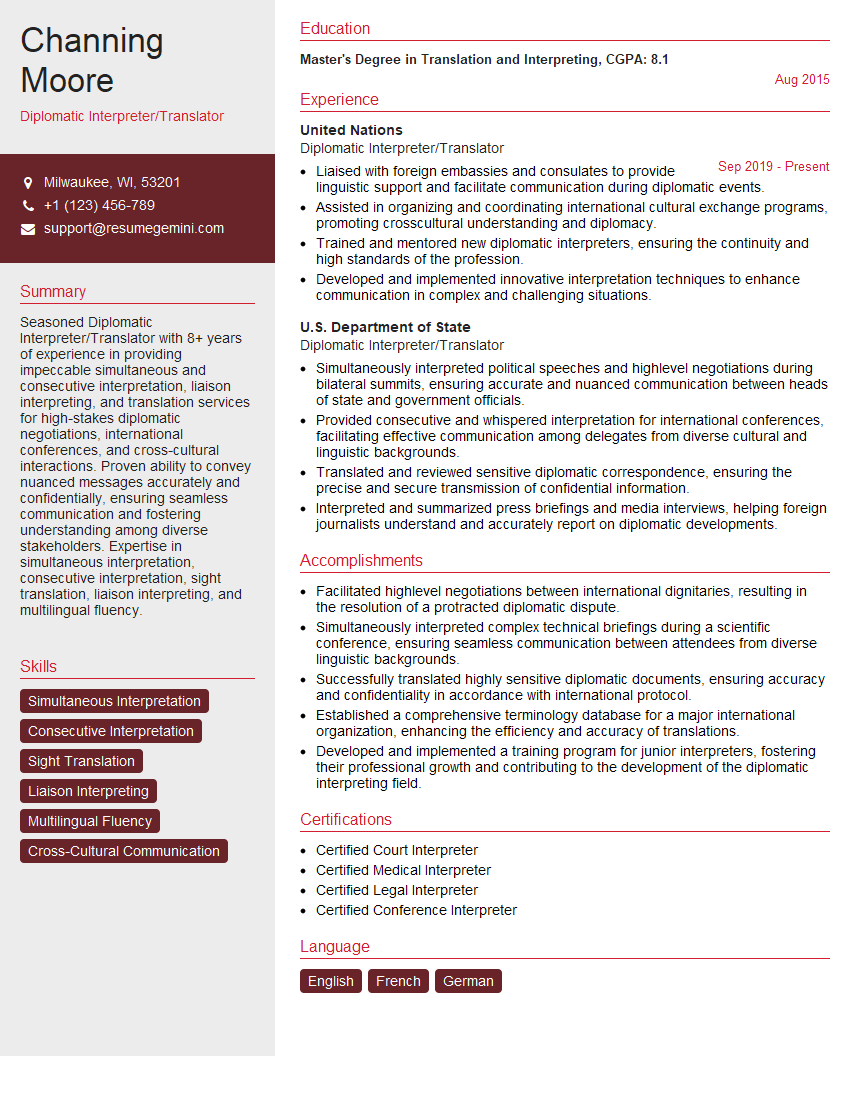Are you a seasoned Diplomatic Interpreter/Translator seeking a new career path? Discover our professionally built Diplomatic Interpreter/Translator Resume Template. This time-saving tool provides a solid foundation for your job search. Simply click “Edit Resume” to customize it with your unique experiences and achievements. Customize fonts and colors to match your personal style and increase your chances of landing your dream job. Explore more Resume Templates for additional options.

Channing Moore
Diplomatic Interpreter/Translator
Summary
Seasoned Diplomatic Interpreter/Translator with 8+ years of experience in providing impeccable simultaneous and consecutive interpretation, liaison interpreting, and translation services for high-stakes diplomatic negotiations, international conferences, and cross-cultural interactions. Proven ability to convey nuanced messages accurately and confidentially, ensuring seamless communication and fostering understanding among diverse stakeholders. Expertise in simultaneous interpretation, consecutive interpretation, sight translation, liaison interpreting, and multilingual fluency.
Education
Master’s Degree in Translation and Interpreting
August 2015
Skills
- Simultaneous Interpretation
- Consecutive Interpretation
- Sight Translation
- Liaison Interpreting
- Multilingual Fluency
- Cross-Cultural Communication
Work Experience
Diplomatic Interpreter/Translator
- Liaised with foreign embassies and consulates to provide linguistic support and facilitate communication during diplomatic events.
- Assisted in organizing and coordinating international cultural exchange programs, promoting crosscultural understanding and diplomacy.
- Trained and mentored new diplomatic interpreters, ensuring the continuity and high standards of the profession.
- Developed and implemented innovative interpretation techniques to enhance communication in complex and challenging situations.
Diplomatic Interpreter/Translator
- Simultaneously interpreted political speeches and highlevel negotiations during bilateral summits, ensuring accurate and nuanced communication between heads of state and government officials.
- Provided consecutive and whispered interpretation for international conferences, facilitating effective communication among delegates from diverse cultural and linguistic backgrounds.
- Translated and reviewed sensitive diplomatic correspondence, ensuring the precise and secure transmission of confidential information.
- Interpreted and summarized press briefings and media interviews, helping foreign journalists understand and accurately report on diplomatic developments.
Accomplishments
- Facilitated highlevel negotiations between international dignitaries, resulting in the resolution of a protracted diplomatic dispute.
- Simultaneously interpreted complex technical briefings during a scientific conference, ensuring seamless communication between attendees from diverse linguistic backgrounds.
- Successfully translated highly sensitive diplomatic documents, ensuring accuracy and confidentiality in accordance with international protocol.
- Established a comprehensive terminology database for a major international organization, enhancing the efficiency and accuracy of translations.
- Developed and implemented a training program for junior interpreters, fostering their professional growth and contributing to the development of the diplomatic interpreting field.
Certificates
- Certified Court Interpreter
- Certified Medical Interpreter
- Certified Legal Interpreter
- Certified Conference Interpreter
Languages
- English
- French
- German
Career Expert Tips:
- Select the ideal resume template to showcase your professional experience effectively.
- Master the art of resume writing to highlight your unique qualifications and achievements.
- Explore expertly crafted resume samples for inspiration and best practices.
- Build your best resume for free this new year with ResumeGemini. Enjoy exclusive discounts on ATS optimized resume templates.
How To Write Resume For Diplomatic Interpreter/Translator
- Highlight your fluency in multiple languages and your expertise in diplomatic protocol and etiquette.
- Showcase your ability to work under pressure and adapt to challenging situations.
- Emphasize your cultural sensitivity and understanding of international relations.
- Provide examples of your successful interpretation or translation work in high-stakes diplomatic settings.
Essential Experience Highlights for a Strong Diplomatic Interpreter/Translator Resume
- Simultaneously interpret political speeches and negotiations, ensuring precise communication between heads of state and government officials.
- Provide consecutive and whispered interpretation for international conferences, facilitating effective communication among delegates from diverse cultural and linguistic backgrounds.
- Translate and review sensitive diplomatic correspondence, ensuring the secure transmission of confidential information.
- Interpret and summarize press briefings and media interviews, helping foreign journalists understand and report on diplomatic developments.
- Liaise with foreign embassies and consulates to provide linguistic support and facilitate communication during diplomatic events.
- Assist in organizing and coordinating international cultural exchange programs, promoting cross-cultural understanding and diplomacy.
- Train and mentor new diplomatic interpreters, ensuring the continuity and high standards of the profession.
Frequently Asked Questions (FAQ’s) For Diplomatic Interpreter/Translator
What is the role of a Diplomatic Interpreter/Translator?
A Diplomatic Interpreter/Translator plays a crucial role in facilitating communication between diplomats, government officials, and individuals from different linguistic and cultural backgrounds. They interpret spoken and written materials accurately and confidentially, ensuring that messages are conveyed clearly and effectively.
What are the key skills required for a Diplomatic Interpreter/Translator?
To excel as a Diplomatic Interpreter/Translator, one requires proficiency in multiple languages, excellent communication skills, cultural sensitivity, a deep understanding of diplomatic protocol, and the ability to work under pressure.
What are the career prospects for a Diplomatic Interpreter/Translator?
Diplomatic Interpreters/Translators are in high demand in various settings, including government agencies, international organizations, embassies, and the private sector. They can advance to senior positions, such as Chief Interpreter or Director of Language Services.
How can I become a Diplomatic Interpreter/Translator?
To become a Diplomatic Interpreter/Translator, one typically needs a bachelor’s or master’s degree in translation, interpretation, or a related field. Additionally, fluency in multiple languages, cultural immersion, and experience in diplomatic settings are essential.
What are the challenges faced by Diplomatic Interpreters/Translators?
Diplomatic Interpreters/Translators face challenges such as interpreting complex technical or specialized terminology, working under intense pressure, and maintaining impartiality and confidentiality.
What is the difference between simultaneous and consecutive interpreting?
Simultaneous interpreting involves interpreting a speaker’s words as they are spoken, while consecutive interpreting involves listening to a speaker’s entire message and then interpreting it afterwards.
What is the importance of cultural sensitivity for Diplomatic Interpreters/Translators?
Cultural sensitivity is crucial for Diplomatic Interpreters/Translators as it enables them to understand the cultural nuances and context of the messages they are interpreting, ensuring accurate and effective communication.